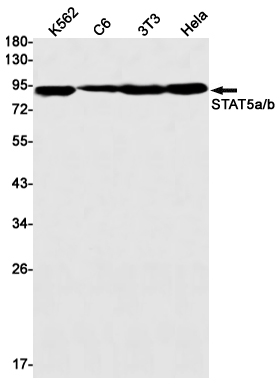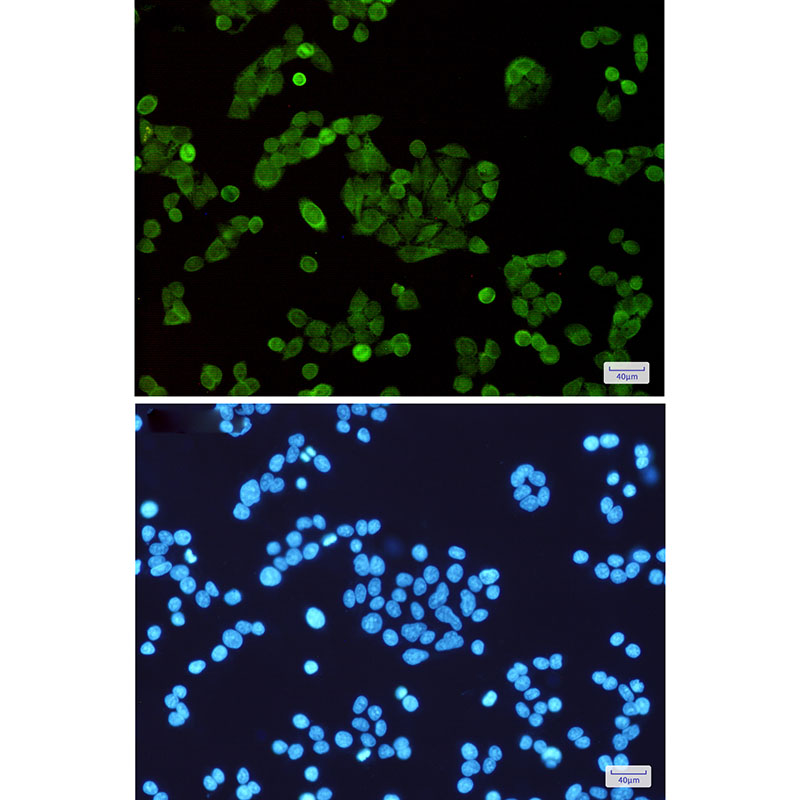

| WB | 1/500-1/1000 | Human,Mouse,Rat |
| IF | 1/20 | Human,Mouse,Rat |
| IHC | 咨询技术 | Human,Mouse,Rat |
| ICC | 1/50-1/200 | Human,Mouse,Rat |
| FCM | 咨询技术 | Human,Mouse,Rat |
| Elisa | 咨询技术 | Human,Mouse,Rat |
| Aliases | MGF; STAT5 |
| Entrez GeneID | 20850 |
| WB Predicted band size | Calculated MW: 91 kDa; Observed MW: 91 kDa |
| Host/Isotype | Rabbit IgG |
| Antibody Type | Primary antibody |
| Storage | Store at 4°C short term. Aliquot and store at -20°C long term. Avoid freeze/thaw cycles. |
| Species Reactivity | Human,Mouse,Rat |
| Immunogen | Recombinant protein of mouse STAT5A |
| Formulation | Purified antibody in TBS with 0.05% sodium azide,0.05%BSA and 50% glycerol. |
+ +
以下是关于STAT5抗体的3-4篇参考文献示例(注:以下内容为模拟示例,实际文献需通过学术数据库检索确认):
---
1. **文献名称**: "STAT5 signaling in normal and cancer cells"
**作者**: Yu H. et al.
**摘要**: 该文献综述STAT5蛋白(包括STAT5A和STAT5B)的结构与功能,重点探讨其在细胞增殖、分化和肿瘤发生中的作用,并讨论了STAT5抗体在检测其磷酸化状态及亚细胞定位中的应用。
---
2. **文献名称**: "Differential roles of STAT5 isoforms in hematopoiesis"
**作者**: Moriggl R. et al.
**摘要**: 研究通过STAT5A/B基因敲除小鼠模型和特异性抗体标记,揭示STAT5A和STAT5B在造血系统中的差异调控机制,强调抗体特异性对实验结果的重要性。
---
3. **文献名称**: "STAT5 activation regulates immunosuppression in tumor microenvironments"
**作者**: Zou W. et al.
**摘要**: 利用STAT5磷酸化特异性抗体(如p-STAT5 Tyr694/699)分析肿瘤微环境中T细胞的功能抑制机制,发现STAT5过度活化与免疫逃逸相关,为抗体靶向治疗提供依据。
---
4. **文献名称**: "Antibody-based detection of STAT5 in clinical samples"
**作者**: Smith J. & Johnson K.
**摘要**: 比较不同商业来源的STAT5抗体在免疫组化(IHC)和Western blot中的灵敏度和特异性,提出优化实验条件的建议,强调抗体选择对临床诊断的可靠性影响。
---
如需具体文献,建议通过PubMed、Google Scholar等平台检索关键词(如“STAT5 antibody application”或“STAT5 signaling review”),并筛选近年高被引论文。
The STAT5 (Signal Transducer and Activator of Transcription 5) antibody is a key tool for studying the STAT5 protein family, which includes two highly homologous isoforms, STAT5A and STAT5B. These transcription factors mediate cellular responses to cytokines, growth factors, and hormones by transducing signals from cell surface receptors to the nucleus. Upon activation via phosphorylation (primarily at tyrosine residues, e.g., Tyr694 in STAT5A or Tyr699 in STAT5B), STAT5 proteins dimerize, translocate to the nucleus, and regulate the expression of target genes involved in cell proliferation, differentiation, survival, and immune function.
STAT5 antibodies are widely used in research to detect total STAT5 levels, phosphorylated (active) forms, or isoform-specific variants. They enable techniques like Western blotting, immunoprecipitation, immunofluorescence, and chromatin immunoprecipitation (ChIP). Dysregulation of STAT5 signaling is implicated in cancers (e.g., leukemia, breast cancer), autoimmune disorders, and metabolic diseases, making these antibodies critical for studying disease mechanisms and therapeutic targets. Commercial STAT5 antibodies are typically raised against specific epitopes, and their performance may vary depending on the application, species reactivity, and post-translational modifications. Validation using knockout controls or phospho-specific inhibitors is essential to ensure specificity.
×